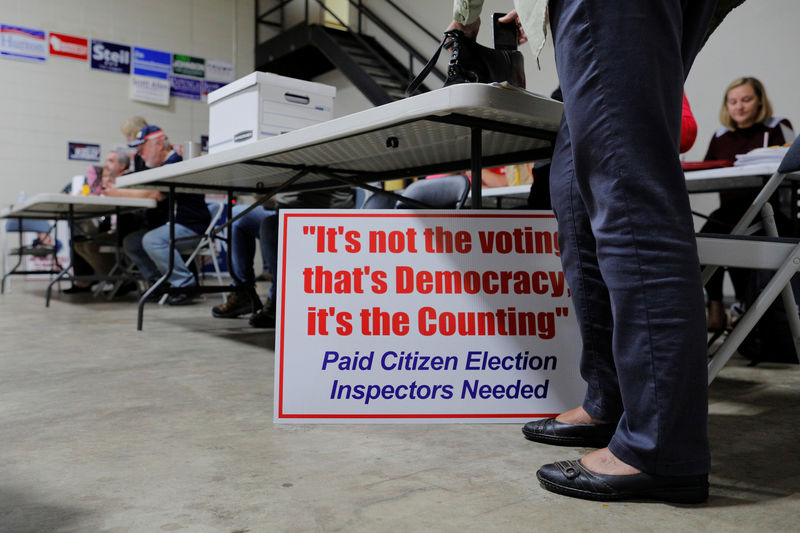By Tim Reid
WAUKESHA, Wis. (Reuters) - Terry Dittrich has been working with Donald Trump's re-election campaign on a simple strategy to win the critical battleground of Wisconsin next year: Turn out even more gun lovers, anti-abortion conservatives and illegal immigration critics than in his surprise 2016 victory in the state.
The move by Democrats in the U.S. House of Representatives to launch a formal impeachment investigation into Trump this week just made that job easier, said Dittrich, chairman of the state's Republican Party in Waukesha County.
"I hate to say it's good for us, but at the end of the day it will help drive up the vote count," Dittrich said. "It shows how crazy and desperate the Democrats are to try and destroy this president and this country."
Wisconsin will be the scene of a turn-out-the-vote "arms race" in 2020 between Republicans and Democrats, a top state Democratic Party official predicted. Democrats, determined not to repeat the mistakes of 2016 when nominee Hillary Clinton never visited the state, will hold their nominating convention in Milwaukee in July.
Within hours of the impeachment inquiry announcement, the Republican National Committee, which is working closely with Trump's campaign, sent party county chairmen across the country talking points against what it called an "impeachment fishing expedition."
The messaging, seen by Reuters, will now become an integral part of an aggressive and unabashed strategy already under way in Wisconsin to turn out more of the Republican base than those who voted in 2016, party officials said.
House Democrats began an impeachment inquiry on Tuesday after a whistleblower complaint revealed that Trump asked Ukraine's president during a July telephone call to investigate Joe Biden, the former vice president and leading Democratic presidential contender.
Democrats accuse Trump of abusing his office and risking national security by seeking foreign interference in the U.S. election in November 2020. Trump has insisted he did nothing wrong.
Wisconsin is a central focus of Trump's campaign after he carried the state by 23,000 votes in 2016, an unexpected victory that along with wins in Pennsylvania and Michigan helped seal his improbable ascent to the White House.
But Trump under-performed in Wisconsin compared to five of the last six Republican presidential nominees.
His strategists believe there is a significant pool of Republican voters who did not turn out for Trump in 2016 because they were unsure about his conservative credentials or felt he did not have a shot at capturing the state.
Unlike his insurgent, first-time candidacy, Trump is heading into the 2020 election with a firm grip on the party and a track record as a proven conservative who kept his promises, they said.
EYES ON WOW COUNTIES
His campaign advisers are focusing their attention on a region near Milwaukee known as the "WOW counties" - Waukesha, Ozaukee and Washington - where Republicans say Wisconsin will be won or lost.
In 2016, Trump received nearly 30,000 fewer votes in the three counties than the 2012 Republican presidential nominee, Mitt Romney.
Those are the voters Republicans want to rally for Trump this time around.
At a recent Trump re-election training session held inside the Waukesha County Republican Party headquarters, decorated with a life-size image of Trump giving a thumbs-up sign, about 50 county chairmen, party activists and volunteers gathered to hear the Wisconsin game plan.
"We are focused on working with Tea Party groups, pro-life groups, hunting groups, gun rights groups - they are all part of the coalition we need to win," said Mark Jefferson, chairman of the Wisconsin Republican Party.
To turn out more of the base, Jefferson and other speakers said, volunteers going door-to-door needed to talk to voters about four issues that polls and focus groups showed most resonated with Republicans.
Those included immigration and the U.S.-Mexico border wall; Trump's appointment of conservative judges and his anti-abortion stance; his tax cuts; and what the speakers described as the Democrats' leftward lurch and their agenda to turn America into a "socialist" country.
In a phone interview this week, Jefferson said the impeachment investigation would also become a rallying cry.
"This has lit a fire under our base, and people are upset," he said.
Americans overall have grown less supportive of impeaching Trump, Reuters/Ipsos polling this week showed. The Sept. 23-24 survey found that 37% of the American public thinks Trump should be impeached, down from 44% in May.
Alan Bingenheimer, 71, a retired engineer in Greendale, south of Milwaukee, said Democrats' push for impeachment would make him fight even harder for Trump.
"I think the Democrats have gone totally insane," he said.
SUBURBAN VOTERS
Of course, the impeachment fight could cut both ways in the battleground state.
Trump continues to struggle nationally with suburban voters, particularly women who have come to disapprove of the president. A Reuters/Ipsos poll from Sept. 23-24 showed 43% of adults who live in suburban areas approve of the president, while 54% do not. Among suburban women, 39% approve of Trump while 56% do not.
Predicting a partisan "arms race" in the state, Wisconsin Democratic Party Chairman Ben Wikler said the probe will reinforce the party's central message to suburban voters that Trump is obsessed with himself and smearing political opponents rather than helping American families.
Alana Morris, 40, a voter in suburban Milwaukee, said she voted for Trump in 2016.
But the mother of two teenage girls now finds him "disgusting" because of his general conduct and the way he talks about women. She doubts she will vote for him again.
The impeachment inquiry, she said, "just adds to the chaos around Trump."
